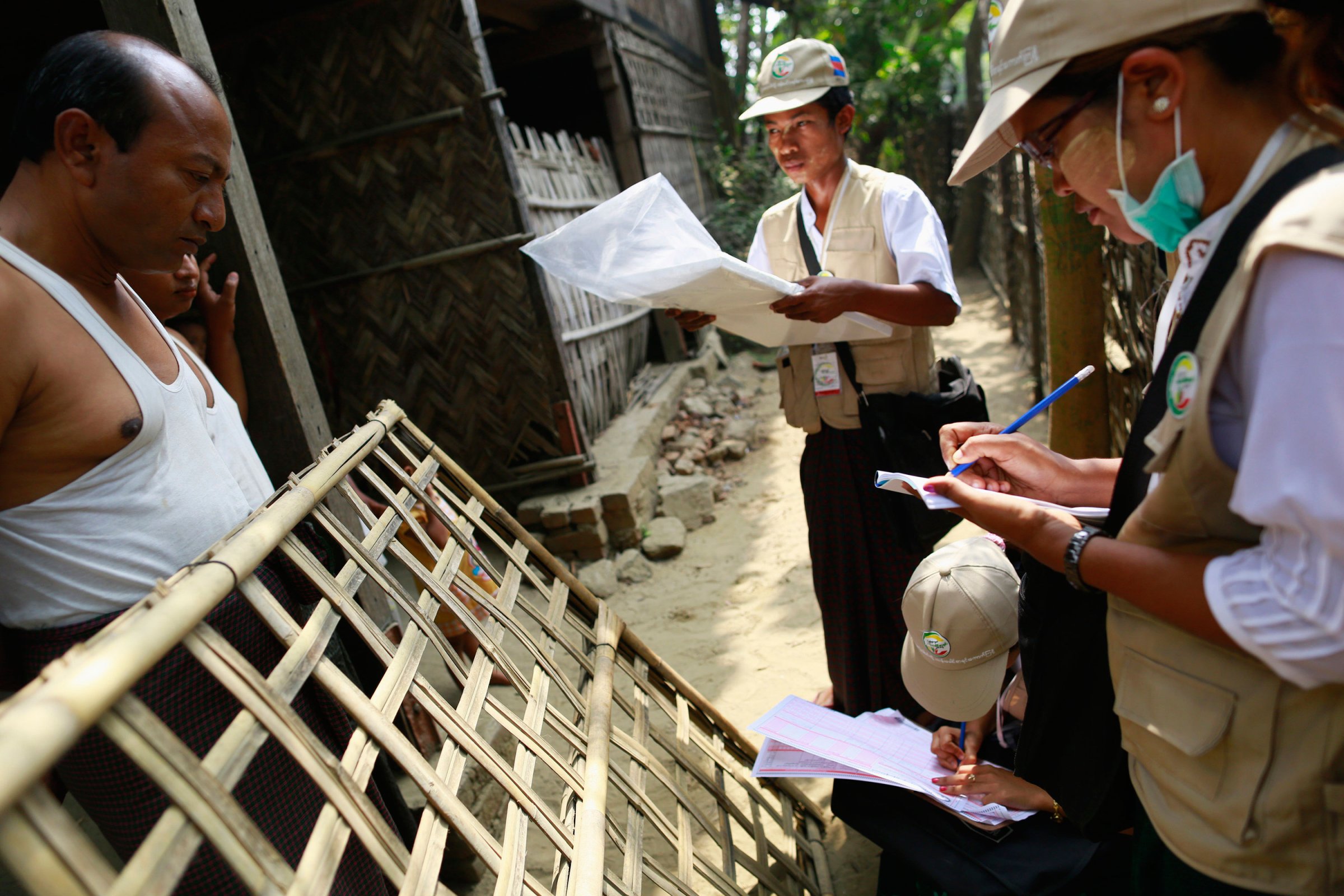
Burma’s first census in three decades has reignited long-smoldering tensions in the nation’s restive west, leading to attacks on aid workers. The U.N. is also facing accusations of complicity in a discriminatory census that does not allow members of the country’s Rohingya Muslim minority to identify themselves as such on census documents.
Late last week, mobs in Rakhine (or Arakan) state launched assaults on international aid organizations, sacking 14 buildings. More than 70 foreign and local staff were evacuated from the state capital, Sittwe, on Friday.
“Rakhine employees are being threatened by their own community to not work for NGOs, in some cases being physically beaten or family members threatened,” said one aid worker, quoted by the news website Asian Correspondent. The aid worker asked to remain anonymous for fear of reprisals.
Boats and vehicles used to deliver aid have also been destroyed, meaning food, clean water and medical supplies will likely run out soon.
Rakhine extremists fear that international aid agencies are biased toward the persecuted Rohingya, and have resorted to violence to enforce an official refusal to recognize the Muslim minority in the population survey.
Around 140,000 Rohingya live in squalid displacement camps following sporadic pogroms over the past two years. They are incorrectly regarded as “Bengali” land-grabbers from neighboring Bangladesh — even though they have lived in Burma (officially known as Myanmar) for generations — and are denied citizenship. They also face strict curbs on marriage, reproduction and travel.
The two-week process to collect basic demographic data on Burma’s estimated 60 million people began on March 30. “If we ask a family about their ethnicity and they say Rohingya, we will not … accept it,” presidential spokesman Ye Htut told reporters on Monday, according to the Irrawaddy.
His statement appeared to backtrack on an earlier government pledge to allow the Rohingya to self-identify on census documents.
Abu Tahay, chairman of the Union Nationals Development Party, which represents the Rohingya, confirmed that Rangoon residents were not allowed to register as Rohingya on Tuesday.
“According to the law of Myanmar everyone has the right to declare their own ethnicity, but they are refusing to accept this,” he says. “The U.N. must take a stand against continued marginalization of the Rohingya by the government.”
William Ryan, Burma spokesman for the U.N. Population Fund (formerly known as the U.N. Fund for Population Activities and still abbreviated by its former initials UNFPA), says that “UNFPA is very concerned by this apparent departure from the procedure for the census.” However, he declined to comment on whether the $75 million, U.N.-funded project was now being turned into a discriminatory tool.
According to Human Rights Watch, the U.N. body is at fault for originally agreeing to conduct the census according to the 135 ethnic groups as set out by xenophobic dictator General Ne Win in his 1982 Citizenship Law. The Rohingya are not among those groups.
“These ethnic classifications risk exacerbating already vexing identity issues as part of the fragile nationwide ceasefire process, and within very diverse communities in ethnic areas,” said the New York City–based group in a statement.
The British embassy in Rangoon also echoed these concerns in a statement. “The government has committed to run the census in line with international standards, including allowing all respondents the option to self-identify their ethnicity,” it read. “We are concerned by recent reports that this commitment may not be met.”
Other Burmese groups representing ethnic minorities such as the Kachin, Wa, Pa-O and Mon have also raised concerns and pledged limited cooperation with the census.
More Must-Reads from TIME
- Donald Trump Is TIME's 2024 Person of the Year
- Why We Chose Trump as Person of the Year
- Is Intermittent Fasting Good or Bad for You?
- The 100 Must-Read Books of 2024
- The 20 Best Christmas TV Episodes
- Column: If Optimism Feels Ridiculous Now, Try Hope
- The Future of Climate Action Is Trade Policy
- Merle Bombardieri Is Helping People Make the Baby Decision
Write to Charlie Campbell at charlie.campbell@time.com